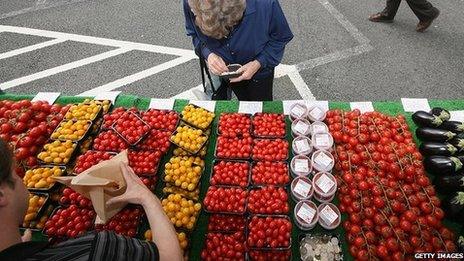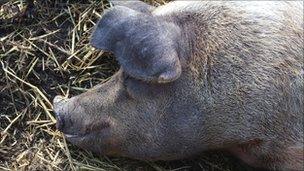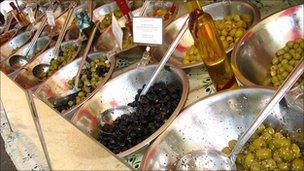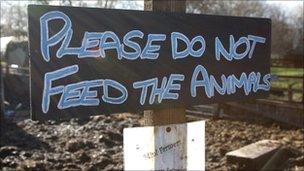London farmers' markets and city farms gain popularity
- Published

Farmers' markets have sprung up in car parks and school playgrounds
As nearly 500 independent food and drink companies show off the fruits of their labour in London this weekend, are shoppers taking a renewed interest in where their food comes from?
Weekly farmers' markets are now held in many London boroughs and garden centres increasingly offer window boxes for grow-your-own herbs.
Along with specialist shops, these give people in inner-city areas the opportunity to obtain fresh, local groceries.
And those who spend time and money producing food for a living demonstrate an infectious "passion", according to the director of this weekend's Real Food Festival at Earl's Court Exhibition Centre.
"Actually talking to those who are producing their food is a whole different experience to going to a supermarket and just walking through aisles of produce," says Philip Lowery.

City farms let children touch animals, many for the first time, and offer workshops in food production
"The people who are doing it generally aren't in it for the money.
"They do it because they care about it and they love it, and actually that really communicates to the visitor."
There are thousands of "amazingly good" food producers in the UK but they are "having a tough time", Mr Lowery adds.
"Supermarkets dominate the food-buying retail world so much that actually it's quite hard for them to find a market to sell their produce.
"We've tried to create a showcase for them in London."
The desire to offer the best homegrown produce is also reflected in the growing number of stallholders who gather weekly around the city in car parks and school playgrounds.
London Farmers' Markets runs nearly 20 regular markets and spokesman Arthur Betts says shoppers "seem to want to know more about where their food is coming from, and we can meet that demand".
'Competitive prices'
"Traders can come from within 100 miles of the M25 and all the produce has to be grown by them, so we don't have any middle men or wholesalers," he says.
Such specialist items can attract high prices - the £2.50 loaf is not uncommon - but Mr Betts says traders are encouraged to include affordable produce alongside exclusive goods.
"The important thing is to provide a range of prices," he says.

Farmers at certified markets in London have to meet certain standards for hygiene and food quality
"There might be somebody producing something specialist, and the price is going to be more specialist for that.
"But on the other hand, there'll always be prices which are competitive with those that can be found elsewhere, including supermarkets."
As well as speaking to traders about the origins of food, gaps in knowledge - especially among children - can be filled by the staff of the 15 city farms in London.
The site in Hackney attracts about 50,000 visitors annually, from nursery-aged children who have never seen an animal up close to those studying to become vets.
"Young people do have an idea of where milk comes from these days," says manager Chris Pounds.
"They're learning that information from us quite young, so we're not getting 10-year-olds saying they thought milk always came in a bottle, but 15 to 20 years ago they were very much more in the dark."
'Growing interest'
Ironically it is easier for children in the city to spend time on a farm than those in more rural areas, he believes.
"Children here have much more access to city farms like ours.
"The country kids might have gone to a small family farm previously, but most of those units have closed down now and they've been taken over by large producers which don't encourage children to get involved."

There are 15 city farms in London, offering everything from llamas and donkeys to rabbits and tadpoles
About 10,000 eggs are produced in Hackney each year, and herbs from the farm are used in its cafe's food, to encourage people to grow their own.
"We're working with the Probation Service and those doing community service," says Mr Pounds.
"We want to get a system where people can make up window boxes.
"We can supply the seeds and the soil, but then they're growing their own food, even if it's on a micro basis."
Back at the festival, Mr Lowery says a "hard core" are even keeping pigs in their gardens these days.
"It's still a niche of a niche, but there's definitely been interest in growing your own and keeping livestock.
"There's no question that when people really start to change they way they eat, they then start cooking more and the next logical step is growing your own ingredients too."
- Published26 July 2010